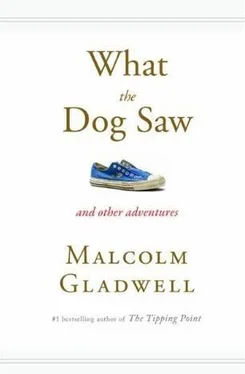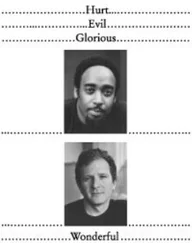On the day of the second attack, according to some accounts, a visitor came by the house of Café’s girlfriend, and the dogs got wound up. They were put outside, where the snowbanks were high enough that the backyard fence could be readily jumped. Jayden Clairoux stopped and stared at the dogs, saying, “Puppies, puppies.” His mother called out to his father. His father came running, which is the kind of thing that will rile up an aggressive dog. The dogs jumped the fence, and Agua took Jayden’s head in his mouth and started to shake. It was a textbook dog-biting case: unneutered, ill-trained, charged-up dogs with a history of aggression and an irresponsible owner somehow get loose and set upon a small child. The dogs had already passed through the animal bureaucracy of Ottawa, and the city could easily have prevented the second attack with the right kind of generalization—a generalization based not on breed but on the known and meaningful connection between dangerous dogs and negligent owners. But that would have required someone to track down Shridev Café and check to see whether he had bought muzzles, and someone to send the dogs to be neutered after the first attack, and an animal-control law that ensured that those whose dogs attack small children forfeit their right to have a dog. It would have required, that is, a more exacting set of generalizations to be more exactingly applied. It’s always easier just to ban the breed.
February 6, 2006
Every one of these stories was rigorously perfected by the copy and fact-checking departments of The New Yorker magazine. They are all wizards. Thank you.

Malcolm Gladwell has been a staff writer with The New Yorker magazine since 1996, and all of the essays in What the Dog Saw first appeared in the pages of that magazine. He is the author of three previous books, The Tipping Point: How Little Things Can Make a Big Difference; Blink: The Power of Thinking Without Thinking; and Outliers: The Story of Success , all of which were number one New York Times bestsellers. Prior to joining The New Yorker , he was a reporter with the Washington Post, where he covered business and science and then served as the newspaper’s New York City bureau chief. Gladwell was born in England, grew up in rural Ontario, and now lives in New York City.
For more information about Malcolm Gladwell, visit his website at www.gladwell.com.
Taleb has since become famous. His second book—published a few years after this profile—was called The Black Swan, and it became an enormous bestseller. And the financial crisis of 2008-2009 made a staggering amount of money for his fund. I ran into him at a conference in the spring of 2009, in the midst of the financial turmoil. “We have billions under management now,” he said, “and we still know nothing.” Typical Nassim. When I was reporting this piece, we would have lunches that would last for hours. The delight I took in his company was offset only by the dread I felt at the prospect of transcribing all those hours of tapes. Neiderhoffer, by the way, has lost and made and lost a number of other fortunes in the intervening years.
Sometimes the gap between hearing an idea and figuring out how to write about it is substantial. In this case, it was almost a decade. While he was in medical school, my friend Chris Grover once pointed out to me that, from an evolutionary perspective, the experience of modern women was profoundly unusual. Up until the beginning of the nineteenth century, women of childbearing age rarely menstruated. Today, they menstruate all the time. I found that fascinating. But how on earth do you fashion a story around that fact? Then I discovered John Rock.
By today’s standards, of course, Enron barely meets the threshold for financial scandal—not after the multitrillion-dollar financial meltdown of the past few years. But I wrote about it twice—here and a few years earlier in “The Talent Myth” (which you can find in part 3), because I felt it was really the paradigmatic scandal of the information age. History has borne this out. Had we taken the lessons of Enron more seriously, would we have had the financial crisis of 2008?
This article was written during the 2008 college football season. Missouri ended up finishing 10-4, and Chase Daniel—who at one point was considered one of the favorites to win the Heisman Trophy—faded down the stretch. He was not selected in the 2009 NFL draft but signed as a free agent with the Washington Redskins.
Not long after this article came out, I debated John Douglas on NPR . I expected him to have some kind of well-thought-out response to the criticisms of Alison and his colleagues. But it quickly became apparent that he had no idea who Alison or any of the other academic critics of profiling were.












